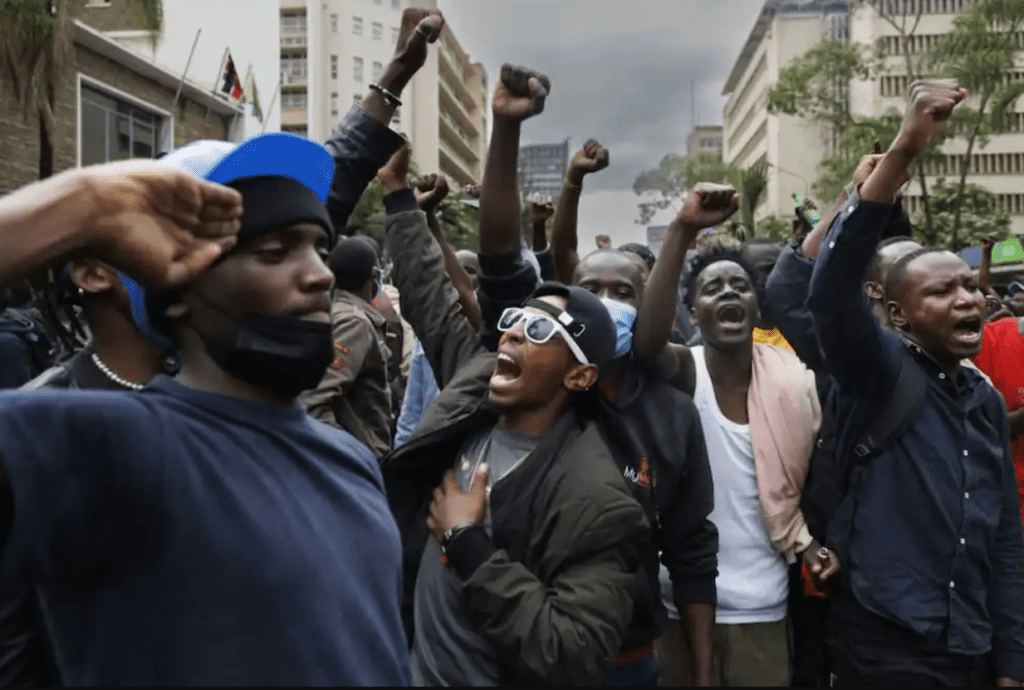Kenya is preparing for a nationwide strike on Tuesday following a call by youth protesters for a countrywide shutdown.
This movement is in response to the government’s proposed tax hikes and has gained significant momentum.
The protests, predominantly led by Generation Z, have taken President William Ruto’s administration by surprise.
Over the weekend, President Ruto expressed his willingness to engage in dialogue with the demonstrators.
The discontent over the high cost of living intensified last week with the proposed tax hikes in the annual finance bill, which parliament must vote on by June 30.
The rallies, although mostly peaceful, were marred by reports of violence.
The Independent Policing Oversight Authority (IPOA) and rights groups confirmed two deaths following Thursday’s demonstrations.
Protest organizers are demanding accountability from the police and the complete withdrawal of the finance bill.
“We’re past the talking stage and won’t be silenced. We demand an end to police violence, respect for our constitutional rights, and the freedom to speak up without fear of arrest or harm,” Hanifa Adan told AFP on Sunday.
Several organizations, including Amnesty International Kenya, reported at least 200 injuries during the Nairobi protests.
“The country stands at a crossroads,” Amnesty International Kenya stated on Monday.
The organization highlighted the growing protests despite mass arrests and injuries, indicating widespread public discontent.
Amnesty warned that escalating force by the government and police could result in more fatalities and legal consequences.
Rights watchdogs have accused authorities of abducting protesters, which they argue is an attempt to intimidate those planning to attend future demonstrations.
“These abductions are intended to intimidate protesters planning to attend future peaceful demonstrations aimed at pressuring MPs to reject the bill,” stated the Kenya Human Rights Commission (KHRC) on Monday.
KHRC called for the unconditional release of all abductees, alleging that police officers in civilian clothes and unmarked cars conduct these abductions mostly at night.
The police have not responded to AFP’s requests for comments on these allegations.
In addition to social media campaigns and street rallies, the protesters have employed unconventional tactics.
For instance, bars were asked to stop playing music at midnight over the weekend, leading to partygoers chanting “Ruto must go” and “Reject finance bill.”
Small groups of Kenyans also protested at various embassies abroad, including in Washington and Paris, as shown by TV images, organizers, and social media.
The protests have garnered support from some Anglican and Catholic church leaders.
During Sunday mass, Archbishop Maurice Muhatia, chairman of the Kenya Conference of Catholic Bishops, urged the government to take the protesters’ concerns seriously and not be in denial.
Despite agreeing to roll back several tax increases, the cash-strapped government still plans to raise some taxes to fill state coffers and reduce reliance on external borrowing.
Kenya’s significant debt, exacerbated by a devaluation of the local currency over the past two years, has made foreign-currency loan interest payments more expensive.
The proposed tax hikes will increase financial pressure on Kenyans, especially as well-paid jobs remain scarce for many young people.
After the government scrapped levies on bread purchases, car ownership, and financial and mobile services, the treasury warned of a 200 billion shilling ($1.56 billion) budget shortfall.
The government now aims to increase fuel prices and export taxes to cover the deficit, a move critics argue will further strain an already high cost of living.
Kenya, while having one of East Africa’s most dynamic economies, still sees a third of its 52 million people living in poverty.
Opposition To Withdraw All Proposed Amendments To The Finance Bill In New Twist

